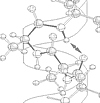

Adrienne Loh: Biophysical & Physical Chemistry
Infectious diseases are the second leading cause of death worldwide and the third leading cause of death in economically advantaged countries. There is increasing evidence of persistent infections caused by microorganisms that are resistant to existing antibiotics, resulting in a serious threat to public health worldwide. Peptide antibiotics offer one promising solution because they act by perturbing cell membranes rather than acting on a specific protein target, making resistance more difficult to develop. Existing designed and natural peptide antibiotics tend to be helical in shape, and have both polar (hydrophiphilic) and non-polar (hydrophobic) regions.In my research program, we are trying to understand how to design peptide antibiotics with predictable structures, and to relate their structures to their lipid binding and cell-killing effectiveness. In particular, we are examining the roles of steric hindrance (“size”, “bulkiness”) and placement of charges (positive and/or negative) on helical structure.
Students in my group use a variety of methods to study these model peptide antibiotics. Some students use NMR spectroscopy to investigate the hydrogen-bonding networks by measuring H/D exchange kinetics or changes in amide proton chemical shift. Some students use NMR data to calculate the 3-dimensional structures of the peptides. Others use circular dichroism (CD) spectrscopy to monitor global structure. A new area of research involves measuring the thermodynamics of peptide-lipid binding using isothermal titration calorimetry (ITC), and measurements of antimicrobial acitivity and cytotoxicity.
Dr. Loh has active collaborations investigating protein folding at Cornell University in Ithaca, NY and investigating peptide/lipid interactions at Université Pierre et Marie Curie in Paris, France.

Loh Homepage UWL Homepage